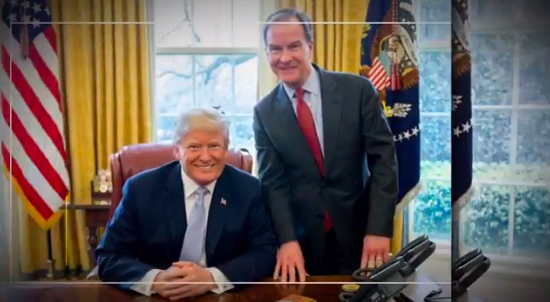“All politics is local” was the mantra of the old-school Boston pol Tip O’Neill (above), who served as Democratic Speaker of the House in the 1980s.
For decades, those were considered wise words to live by for office holders and candidates within both parties. After all, Deep South Democrats were different from the Dems along the East Coast. Republicans in the Rocky Mountain West diverged from most GOPers in New England.
It made little sense for either party to demand cookie-cutter candidates who ignored issue agendas that contrasted from one region to the next in favor of some national purity test.
But 2018 may mark the breaking point in that approach toward politics, at least among congressional and gubernatorial hopefuls. In this era of Donald Trump and Bernie Sanders, personalities rule over pragmatism, and polarization based on strict ideology – far right vs. far left – becomes the norm.
Unquestioning loyalty is demanded.

Trump and GOP gubernatorial candidate Bill Schuette in the Oval Office.
In Michigan, we’ve seen Republican candidates cling tightly to President Trump, despite his bombastic rants, in a sharp departure from the traditional, modest traits of Upper Midwestern Republicans in the past. Pro-Trump devotion is a must to hold onto office while making way through the GOP primary.
Many Michigan Democrats, even those seeking votes in relatively conservative blue-collar areas, display near-fealty to the new crop of Democratic Socialists and left-wing Millennials who cozy up to Sanders and the Dems’ young superstar, New York congressional nominee Alexandria Ocasio-Cortez. This changing of the guard is so prominent that the hard-nosed union leaders who have dominated the state’s Democratic politics for decades are crassly pushed aside by the newbies who want control of the party.
Candidates face the national checklist
On a broader level, the base of support in both parties seems to increasingly embrace a checklist that demands all candidates, from sea to shining sea, adhere to the ideological demands of their respective tribe.
In the 2018 primaries, Democratic contenders must check all the right boxes: favoring Medicare for all health insurance, staunchly pro-gun control, against tax cuts that in any way benefit the wealthy, for a $15-an-hour minimum wage, opposed to deportation efforts aimed at illegal immigrant families. The increasingly extreme immigration stance on the left calls for abolishing ICE, the Immigration and Customs Enforcement agency.
At the same time, Republican candidates must stand by the president, regardless of his most recent controversial statements or misinformation. The demands placed on them call for support of all tax cuts and deregulation, opposition to immigration leniency, support for trade tariffs, and backing for the widespread foreign policy upheaval aimed at America’s traditional allies.

Ocasio-Cortez
Issues that are particular to the local or state level seem to increasingly mean little when measured against the national treatise – more specifically, the two versions of virtue that rule over all else among the Dems, and the GOP.
“All politics is local” has been replaced by “bite the bullet.”
Midwestern Republican candidates who loyally back GOP deregulation and defunding of environmental protection efforts that help keep the Great Lakes clean and safe will certainly find themselves at odds with countless Republican-leaning voters in November.
Southern Democrats who embrace a sketchy, multi-trillion-dollar plan for national single-payer health care will face a backlash from Dem-leaning voters who see this move as support for “free stuff.” After all, two of the most progressive states in the nation, California and Vermont, both abandoned plans for statewide universal health care when lawmakers added up all the astronomical costs.
National issues override local issues
What’s more, this absolutist approach encourages “gotcha” questions, from both the intraparty purists and the opposition party, that stray far from local-state-regional concerns.
Candidates for governor face queries about the Middle East, or their views on the Paris Accord to control climate change, or the U.S. travel ban affecting refugees from majority-Muslim countries.
Peter Beinart, a prominent commentator and now a journalism professor at the City University of New York, wrote a piece today for The Atlantic that takes aim at the old Tip O’Neill approach to politics.
Beinart notes that, in the former speaker’s Boston-area backyard, Tuesday’s congressional primary election “produced one of the most remarkable upsets of this remarkable political season as Boston City Councilwoman Ayanna Pressley clobbered longtime incumbent Rep. Michael Capuano.”

Pressley
Capuano was a longtime, loyal liberal in the House – a 66-year-old white male. Pressley, a 44-year-old black woman, is a rising star in the Massachusetts Democratic Party.
Clearly, Capuano was a Boston good old boy who enjoyed wide support among the Dem establishment heading into the primary. Every poll showed him winning. Yet, Pressley, a Chicago native, stunned party elites by posting a win of about 18 percentage points. Capuano was the successor 20 years ago to Joseph Kenney II – son of Robert Kennedy – and his House district comprised much of the territory that O’Neill had once represented. Demographic diversity and identity politics snuck up on the incumbent.
Local issues no longer a deciding factor
Beinart offers this analysis:
Like generations of Massachusetts pols before him, (Capuano) attended law school at Boston College. He served as an alderman in (suburban) Somerville, then mayor. He garnered the endorsements of Boston’s top Democrats. In a recent profile, The New York Times described him as “talking knowingly about local issues with a range of leaders he has cultivated for years” in a “thick Boston accent.”
It didn’t matter. Yesterday, Boston, a city long known for its insularity and its racism, voted to replace Capuano with Pressley, an African American woman born and raised in Chicago.
… These days, southern Democrats sound like Democrats everywhere else. In their gubernatorial primary earlier this, Georgia Democrats nominated Stacey Abrams, whose pro–abortion rights, pro–gun control, pro-immigrant liberalism would fit in comfortably in California. Florida Democrats nominated Andrew Gillum, a former Bernie Sanders supporter who wants to impeach Donald Trump and abolish Immigration and Customs Enforcement. In Texas, which once sent conservative Democrats like Lloyd Bentsen to the Senate, Beto O’Rourke is praising NFL players who kneel during the national anthem and slamming Ted Cruz for taking money from the National Rifle Association.
In recent months, the Democratic National Committee has shunned attempts to outline a national party platform for the midterm elections. They’ve tacitly embraced an approach in which each candidate chooses the best moves forward toward victory in November based on local political issues and concerns. But the rising Millennials and Dem Socialists demand a chaste approach, much like the GOP Tea Party of 2010.
The decline in local media is a key factor
Perhaps the biggest reason that national adherence to core stances on issues, regardless of locality, has prospered is rooted in profound changes in the media. Cable channels, commentators in the print media, and countless political websites have taken direct aim at each other, prompting liberals and conservatives to cement which side they’re on, regardless of any room that exists for compromise. It’s a knee-jerk world where both camps are angrily, endlessly eager to give the opposition a kick in the ass.
Author Dan Hopkins, a University of Pennsylvania political scientist, identified this trend in his book, “The Increasingly United States: How and Why Political Behavior Nationalized.” Now, Hopkins and Beinart converge at this point in the 2018 elections.
The brutal decline in the quality and consumer loyalty regarding local media – mostly among newspapers but also local TV outlets – is due in part to dramatic cuts in journalism manpower. For the under-40 crowd, the lack of knowledge about local issues goes well beyond media quality or quantity to a sheer lack of interest, a lack of a local identity or shared culture. Instead, on their smartphone screens they pay attention – very briefly – to daily stories produced by like-minded national media outlets ranging from Yahoo to cable TV videos to the usual fare on YouTube, Twitter and Facebook.
With Fox News leading the way, news consumption among all age groups is no longer influenced by geography, instead it consists of a choice overwhelmingly determined by perceived ideological supremacy. As a result, Democrats in Florida and Georgia increasingly resemble Democrats in Massachusetts and New York.
The common denominator? They’re all watching MSNBC.





